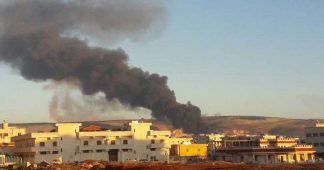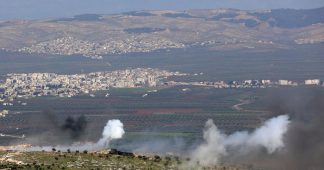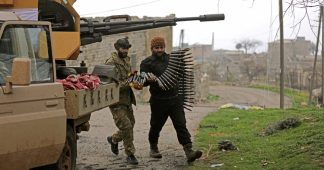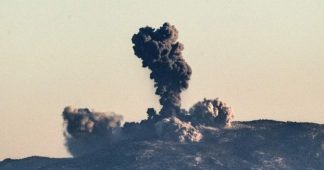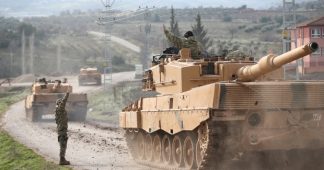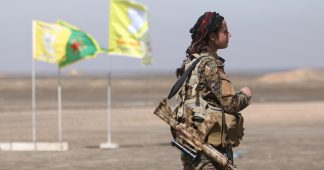By James Jeffrey
March 15, 2018
Turkey has had considerable military success in its two-month old campaign against the Syrian Kurdish militia in the northwest Syrian border province of Afrin, but final victory may be difficult given realities in Syria. The U.S., now working better with Turkey on Syria since a January low point, could help secure a compromise.
Turkish Foreign Minister Mevlut Cavusoglu announced March 6 that the Afrin campaign should finish by May. Unanswered is what Turkey defines as a ‘victory.’ This is of vital concern given strains the Afrin operation has put on the U.S.-Turkish relationship. Washington partners with Kurdish forces in the east against ISIS, though U.S. officials insist the coalition has not partnered with any of the Kurdish elements in Afrin.
The Afrin campaign also complicates the extremely dangerous situation in Syria— with multiple conflicts involving the U.S., its allies Turkey and Israel, a loose Russia-Syria-Iran coalition, and local actors such as ISIS and the Syrian Kurdish militia.
Any ‘solution’ to Afrin has to meet minimum Turkish victory conditions, but be ‘sellable’ to Syria’s main Kurdish party, the PYD.
Turkey, for understandable reasons, considers the PYD – and its YPG militia, aka “People’s Protection Units” – to be an arm of the Turkish Kurdistan Worker’s Party or PKK. The PKK has fought for Kurdish independence inside Turkey since 1984 – and also has had off-and-on close relations with the Assad regime.
Central to Turkey’s goals is blocking a Kurdish state on its southern border. Thus Turkey reacted strongly to the gambit by its longtime ally, Iraqi Kurdish leader Massoud Barzani, for independence for Iraq’s Kurdish north last September, despite Barzani’s antipathy to the PKK. Turkey is even more concerned about a possible Kurdish state within Syria, as a threat in itself, and a tool for Iranian and Assad regime destabilization of Turkey.
Turkey nevertheless tolerated a de facto Kurdish state in northern Syria once Syrian troops abandoned those areas when the civil war began in 2011. Turkey then allowed the U.S. in 2014 to reinforce the Kurdish militia besieged in the border city of Kobane by ISIS, resulting in an alliance between the U.S. and Kurds that has all but destroyed ISIS in Eastern Syria.
Turkey took these decisions, first, because then-Prime Minister Recep Tayyip Erdogan was attempting to end the struggle with the PKK through a ceasefire, and second, because the U.S. had promised that cooperation with the Syrian Kurds would be temporary, tactical and transactional to destroy ISIS, which Turkey also saw as a foe. (The U.S. renamed the largely Kurdish YPG as the ‘Syrian Democratic Forces’ to distance it from the terrorist-designated PKK).
But in 2015, domestic considerations led Ankara and the PKK to end their ceasefire. Then in 2016, Syrian Kurdish militia supported by the U.S. moved west of the Euphrates to Manbij, while other Kurdish forces pushed east from Afrin, to unify all Kurdish territories and cut Turkish access to Arab allies.
Turkey blamed the U.S., marched into northern Syria to block the YPG, and demanded the U.S. pull YPG forces out of Manbij. The U.S. agreed, but did not comply, creating a serious rift in the U.S.-Turkish alliance.
The situation deteriorated further in 2017, with a series of events that sparked the Afrin operation: Barzani’s independence gambit; Erdogan’s elections alliance with the rabidly anti-Kurdish National Action Party; and most dramatically, a sudden change in U.S. policy. The U.S. shifted from ‘temporary and tactical’ cooperation with the PYD/YPG against an ISIS, which helped decimate the terrorist group, to a new mission with more general goals: remaining in Syria with the PYD/YPG to prevent a resurgence of ISIS and to counter the influence of Iran.
Afrin – devoid of U.S. troops, and a launchpad for past PKK attacks against Turkey – was the perfect showplace for a Turkish counter move.
Turkey insists Afrin is only the first step to cleansing the entire northern border of PYD/YPG elements, but this is unrealistic. It would mean a huge conflict with millions of Kurds with impact on Turkey’s own Kurds, a possibly violent break with the U.S., and likely opposition from Russia. Moscow permitted the Afrin operation to drive a wedge between the U.S. and Turkey, but would not want a bigger Turkish Syrian enclave.
Turkey will decide what its ultimate Afrin goals are, but these likely would include:
- eliminate Afrin as a threat by creating a buffer zone with Turkish troops and local Arab allies;
- demonstrate military capabilities to deter the PYD/YPG;
- show that the US will not support the PYD/YPG against Turkey; and
- protect broader Turkish interests in Syria, including countering the Iranian-Russian-Assad alliance and moving three million Syrian refugees now in Turkey back home.
Turkey could achieve the first three goals by a bloody conquest and subsequent occupation of Afrin city, with over half a million people, or by a long, brutal siege. But even these options would not necessarily destroy a PYD/YPG trained to ‘go underground.’
Moreover, these strategies would create a quagmire causing immense damage to the U.S.-Turkish relationship, blotting Turkey’s humanitarian reputation in a way even Erdogan would regret, and possibly provoking Russian intervention, and thus failing to achieve the ultimate goal of moving three million Turkish refugees back to a Syria not dominated by Iran.
Turkey could declare victory and withdraw to a border buffer zone, but that likely would not meet Erdogan’s need for a clear ‘victory’ to win upcoming elections.
That leaves, as the ‘least worst’ solution, a negotiated ceasefire to reduce Syrian Kurdish militia power, while allowing Turkey and local allies the run of Afrin province. Such an approach could include the Assad regime putting limited Syrian forces (who usually get along with the PYD/YPG) back into Afrin.
Turkey and Damascus then could jointly control access to Afrin to block PYD/YPG reinforcements, remove heavy weapons and facilitate UN humanitarian assistance, similar to other ceasefires brokered by Turkey and Russia, but this time backed by Turkish troops. If the Assad regime does not cooperate, Turkey could do a ceasefire with the PYD/YPG through UN or US contacts.
While these variants require indirect Turkish contact with the PYD/YPG, Ankara has done so before with the PKK, and would be playing a strong hand given its military success.
The U.S. could support any variant of this option by persuading its Syrian Kurdish partners to accept an Afrin ceasefire in return for a compromise in Manbij and continued U.S.-Kurdish cooperation east of the Euphrates free of Turkish threats. This would take much of the pressure off of the toxic U.S-Turkish-PYD/YPG relationship, allow renewed action against ISIS remnants, and improve U.S.-Turkish cooperation to contain Assad and the Iranians—which are the greater threat to both Turkey and the U.S.
